#disney review
Text
since a lot of the Wish hate has been coming from YouTube I tried my best to put my own word out there. Feel free to watch
youtube
#Wish#Wish Disney#Wish 2023#Wish movie#Asha wish#King magnifico#Star wish#Disney#Disney review#Wish review#Animation#YouTube#Youtube
18 notes
·
View notes
Text
It's incredible that Herbie got four sequels. It's also incredible how bad the last one is.
#herbie goes bananas#herbie the love bug#disney#disney movie#disney review#disney blog#live action#wacky comedies#1980s#disney sequels
5 notes
·
View notes
Text
Giraffe's Eye View: Christmas Specials Special (2023) | From All Of Us to All Of You
Chestnuts are roasting on an open fire. Jack Frost is nipping at your nose. Mom and dad can hardly wait for school to start again. All the dogs in the neighborhood somehow learned to bark Jingle Bells in sync. Yet retail workers are still more annoyed with Mariah Carey. Snow is getting shoveled, tossed, and formed into sentient beings leading parades without permits. It makes for an excellent distraction as the Krampus abducts children for bad behavior. Fruitcake is exchanged only to find its permanent home in the garbage. Terrorists have hijacked the Holiday office party right before your boss can give you a Jelly of the Month Club membership as your bonus. And of course, the Turducken has returned to wreak its fiery vengeance upon an unsuspecting world! If all this doesn’t put you in the Christmas spirit, perhaps these following Holiday specials will!
Greetings people of today and robots of tomorrow! It is I, Santa Clark, your geeky giraffe friend with a deep love of Christmas! My obsession for the yuletide is rivaled only by Maleficent’s hatred for it, which is saying a lot considering she once teamed up with Mad Madam Mim to kidnap the literal Spirit of Christmas. Yes, that really happened. I know this due to my annual pilgrimage to the Island of Misfit Specials, home to obscure or nerdy festive media ranging from movies, TV episodes, and comics. It’s no easy journey. Constantly I find myself confronted by sinister snowmen, genocidal gingerbread men, and worst of all, crappy commercials. Getting stabbed in the foot by a candy-cane wielding cookie is one thing, but I swear I’ve seen that ad for Wilbur’s White Elephant Gift Emporium more times than I’ve seen Miracle on 34th Street! Sometimes at night I catch myself reciting that jingle. Wilbur’s White Elephant Gift Emporium: Where Christmas meets Convenience! Huh, maybe Maleficent had a point.
Nah, my deep-rooted appreciation for this time of year can weather even the most moronic marketing! It helps that most of the merry media I’ve seen have put me in the perfect Holiday mood! Examples include the time a Ninja Turtle found himself trapped in a truck full of stollen toys, a drunk department store Santa stumbling onto a wish-granting magic bag, Big Bird nearly becoming a popsicle, Gwenpool waking up in a world where Galactus took the place of jolly ol’ Saint Nicholas, a terrifying tree stump trying to slaughter some saps over a stupid ship war, and the year when Death gave the Little Match Girl the greatest gift of all. Needless to say, I thought I had seen it all. That is, until I took my friends on a trip to the Island, tasking them to find me new, strange, seasonal specials to review! Some of them were fair, finding me festive favorites as comforting as coco in front of the fireplace. Others were fiendish, wanting to feed off my misery like Gremlins after midnight. Regardless of how naughty or nice my companions were, I’ve compiled all of their suggestions into a makeshift advent calendar! So stay tuned everyday until Christmas to see how badly my buddies can shred what little sanity I have left.
On the thirteenth day of Christmas, my buddies gave to me...

Being a Disney fan today is hard. The parks have been ravaged, their films flop on arrival, their continued downplaying of animation is annoying, and don’t even get me started on how they handled this year’s Writer / Actor Strike. Not to say there’s no diamonds hidden in the rough every now and again, but for the most part the buzzards running the Mouse House believe in profits not pixie dust. Worse, they have forgotten the most crucial ingredient to any creative undertaking: risk. Go big or go home, make a splash or stay dry, spending money makes money. Perhaps no one knew this better than Walt Disney himself. The man mortgaged his home to finance Snow White, nearly drove his company to bankruptcy to build Disneyland, and embraced television when the rest of Hollywood cowered in fear of it. He understood that television could be a powerful marketing tool that could help his brand grow in the long haul. Ironic, innit? Uncle Walt became a beloved figure through the small screen, hosting the Disneyland series and making a brief appearance at the opening from From All Of Us to All Of You. Premiering in 1958, the seasonal special proved so popular that it airs along with a sampling of various shorts to this day in other countries. Including Sweden, home to the rambunctious robotroll SIM-N (Finjix), himself having fond memories of watching it with his family. Being a classic Disney fan myself, I was actually eager to see if the hype the malicious machine was peddling was valid.
A pity it’s not on Disney+! First the Star Wars Holiday special, then Snowed in at the House of Mouse, and now this!? You advertised everything would be on there, Bobby Boi. What gives!? Thankfully where you fail, the Internet succeeds! Let’s just say I found a copy well archived on a specific site. It also had One Hour in Wonderland, Walt’s original Holiday offering from 1950. Sadly it was nothing special, just the Magic Mirror from Snow White showing clips from several projects to Kathryn Beaumont, Bobby Driscoll, Edgar Burgen and his iconic puppet pals. Aside from Walt’s daughters Diane and Sharon making a brief cameo, this trip to Wonderland is only notable for how many times it promotes Coca Cola. Man, is anybody else thirsty for a Sunkist?
Let’s pop a cold one and we can check out From All Of Us together!
Walt, now the same size as Tinkerbell, welcomes us to the program. He wishes everyone at home a Merry Christmas before turning things over to the real musical Masters of Ceremony; Jiminy Cricket (Cliff Edwards) and Mickey Mouse. Together on piano the cartoon celebrities sing a rousing rendition of The Little Drummer Boy mixed with Peace on Earth! Or rather Jiminy just shows off his collection of Christmas cards. Each card cues up a segment from a beloved animated feature that’ll already has or will be unnecessarily rebooted in live-action. Which features depend on the version you're watching, this recreation including Bambi, Peter Pan, Cinderella, Pinocchio, Snow White and the Seven Dwarves, along with two additional short films, Toy Tinkerers and Santa’s Workshop. The former features famous foul Donald Duck (Clarence Nash) comically dueling against Chip and Dale in toy warfare, the latter showing Santa prepping at the Pole for his annual sleigh ride. It also features an unfortunate bit of blackface, something I hope is cut from reruns. At least they didn’t show an entire segment from Song of the South like One Hour did. Remember folks, Disney’s most controversial film was once endorsed by Coca-Cola!
Overall, From All Of Us is decent blend of Holiday warmth and Disney magic, a warm cup of cocoa laced with a pleasant amount of pixie dust. However, I feel like it’s unnecessary in this modern age. Call me crazy, but why watch this clip show when I’ve seen these movies in their entirety via VHS, DVD, Blu-Ray, or streaming? For SIM-N, the answer is comforting nostalgia. While I might see it as regifted film scenes with barely any new material, SIM-N sees it as an excuse to get together with his family and watch the moments that made us realize magic was real. Knowing that makes this special a yuletide treasure in my book. Still, if you want some comforting Christmas capers centered around Mickey Mouse, I can do you one better. Or should I say three better?

< PREVIOUS REVIEW | INDEX | NEXT REVIEW >
#clarktooncrossing#review#tv review#From All Of Us to All Of You#Walt Disney#Disney100#Christmas#Christmas 2023#Christmas review#Giraffe's Eye View#geeky giraffe#SIM-N#Finjix#Donald Duck#Santa Claus#jiminy cricket#Bing Crosby#David Bowie#One Hour in Wonderland#Disney review#Disney#Coca Cola#Song of the South#Bambi#Peter Pan#Cinderella#Pinocchio#Snow White and the Seven Dwarves#Toy Tinkerers#Santa's Workshop
2 notes
·
View notes
Text
Here’s the thing about the adorkable complaint isn’t really going to impact my view on enjoying Wish.
Asah is an Afro-Latina and we need Black woman to be adorkable. We already had working harding ambitious, Tiana.
I enjoyed the movie it was after all a children’s movie talking about revolution and following your dreams. Even if you don’t achieve, it’s the pursue of a wish that makes life worth living.
I feel like people want really profound messages that and are looking to a Disney movie to answer Adult questions. I’ll be writing a review for sure.
5 notes
·
View notes
Text
Eighth Anniversary: Twelve Movie Reviews in One Post - Again!
It’s Up On The Shelf’s eighth anniversary!
And since last year’s method of doing some quickie reviews went over like gangbusters, I’m doing it again! Every movie is spoiler-free selected at random from a list of films I watched last year, one from each. Here we go!
Continue reading Untitled
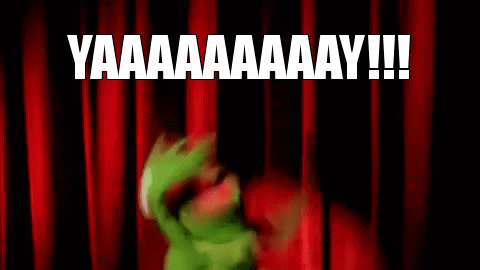
View On WordPress
#A Knight’s Tale#adventure#animated#animated movie review#animation#anniversary#chip and dale#Chip and Dale Rescue Rangers#Christmas#Christmas review#Christmas Vacation#Disney#disney animated#disney animation#disney review#Encanto#fairy tale#Fantasy#film review#Hilda#Hilda and the Mountain King#movie review#musical#My Big Fat Greek Wedding#National Lampoon’s Christmas Vacation#netflix#Once Upon a Time in Hollywood#Pee Wee’s Big Adventure#Rescue Rangers#review
2 notes
·
View notes
Text
people are drawing Steamboat Willie Mickey doing all this crazy shit and whatnot, but you could always do that. you can do that now, with current Mickey, just fine. it's fanart and it's legally protected. hell you could take Disney-drawn Mickey and put a caption about unions or whatever on it and it would still be protected under free speech and sometimes even parody law.
what is special about public domain is that you can SELL him. you could take a screenshot and sell it on a tshirt. you can use him to advertise your plumbing business. people have already uploaded and monetized the original film.
you could always have Mickey say what you want, but now you can profit off it.
#steamboat willie#Mickey mouse#Disney#public domain#you can't trademark him as like a logo or mascot of your plumbing business i just mean like#you can slap him in your commercial or side of the van#i just have seen soooo many people make ORIGINAL art of him and I'm like#no that's not the point!! you can already do that!!!#(obvs if it's a comic or something talking about him being free or whatever then yeah like i get it)#(but those people who put him as a fighter in their game?? Quinton reviews uploading the original video?? boss shit)#(THAT'S what it's about)
30K notes
·
View notes
Text
Disney's Wish
Look, Disney's Wish has been universally panned across the internet, and for good reason.
It’s just…kind of okay.
When we sit down to watch a Disney film—you know, from the company that dominated the animation industry from 1989 to (arguably) the mid 2010’s and defined the medium of animation for decades—we expect something magnificent. Now, I could sit here and tell you everything that I thought was wrong with Wish, but if you’re reading this review, then I imagine that you’ve already heard the most popular gripes from other users across the web. So, let me focus in:
The biggest problem with Wish—in fact, the only problem with Wish—is Magnifico.
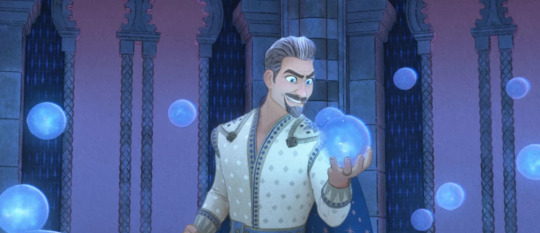
Whoa, that’s crazy! There’re so many things about Wish that could’ve been better! The original concept was stronger! The music was bad--
I hear you, I do. But stay with me here, okay? Take my hand. I studied under artists from the Disney renaissance. I teach an adapted model of Disney’s story pipeline at a University level. I spent a ridiculous amount of time getting degrees in this, and I am about to dissect this character and the narrative to a stupid degree.
First, we need to understand that a good story doesn’t start and end with what we see on the screen. Characters aren’t just fictional people; when used well, characters are tools the author uses (or in this case, the director) to convey their message to the audience. Each character’s struggle should in some way engage with the story’s message, and consequently, the story’s theme. Similarly, when we look at our protagonist and our antagonist, we should see their characters and their journeys reflected in one-another.
So, what went wrong between Asha & Magnifico in terms of narrative structure?
Act I
In Wish, we’re introduced to our hero not long into the runtime—Asha. She’s ambitious, caring, and community-oriented; in fact, Asha is truly introduced to the audience through her love of Rosas (in “Welcome to Rosas”). She’s surrounded by a colorful cast of friends who act as servants in the palace, furthering her connection with the idea of community but also telling us that she’s not of status, and then she makes her way to meet Magnifico for her chance to become his next apprentice.
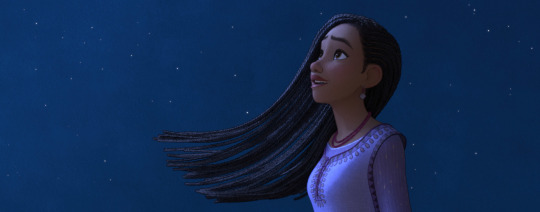
Quick aside: I'm not going to harp on Asha as a character in the context of Disney's overall canon. Almost every review I've seen covers her as a new addition to Disney's ever-growing repertoire of "Cute Quirky Heroines", and I think to be fair to Asha as an actor in the narrative, it serves her best to be weighed within the context of the story she's part of.
As Asha heads upstairs for her interview, we're introduced to the man of the hour: Magnifico. He lives in a tower high above the population of Rosas, immediately showing us how he differs from Asha; he’s disconnected from his community. He lives above them. He has status. While the broader context of the narrative wants us to believe that this also represents a sense of superiority, I would argue that isn’t what Magnifico’s introduction conveys; he's isolated.
Despite this distance, he does connect with Asha in “At All Costs”. For a moment, their goals and values align. In fact, they align so well that Magnifico sees Asha as someone who cares as much about Rosas as he does, and almost offers her the position.
… Until she asks him to grant Saba’s wish.
This is framed by the narrative as a misstep. The resonance between their ideals snaps immediately, and Magnifico says something along the line of “Wow. Most people wait at least a year before asking for something.”
This disappointment isn't played as coming from a place of power or superiority. He was excited by the idea of working with someone who had the same values as he did, who viewed Rosas in the same way he does, and then learns that Asha’s motivations at least partially stem from a place of personal gain.
Well, wait, is that really Asha's goal?
While it's not wholistically her goal, it's very explicitly stated & implied that getting Saba's wish granted is at least a part of it. The audience learns (through Asha's conversation with her friends before the interview) that every apprentice Magnifico has ever had gets not only their wish granted, but the wishes of their family, too! Asha doesn’t deny that this is a perk that she’s interested in, and I don't think this is a bad thing.
So, Is Asha’s commitment to Saba selfless, or selfish? I’m sure the director wanted it to seem selfless, wherein she believes her family member has waited long enough and deserves his wish granted, but we can’t ignore the broader context of Asha essentially trying to… skip the line.

Then, we get our first point of tension. Magnifico reveals his “true colors” in snapping at Asha, telling her that he “decides what people deserve”. This is supposed to be the great motivator, it’s meant to incite anger in the audience—after all, no one gets to decide what you deserve, right? But unfortunately for the integrity of the film and the audience's suspension of disbelief, at least part of Magnifico’s argument is a little too sound to ignore:
Some wishes are too vague and dangerous to grant. Now, there’s visual irony here; he says this after looking at a 100 old man playing the lute. The idea that something so innocuous could be dangerous is absurd, and the audience is meant to agree.
... But we’ve also seen plenty of other wishes that might be chaotic—flying on a rocket to space, anyone? The use of the word vague is important, too—this implies wording matters, and that a wish can be misinterpreted or evolve into something that is dangerous even if the original intent was innocuous. His reasoning for people forgetting their wish (protecting them from the sadness of being unable to attain their dreams) is much weaker, but still justifiable (in the way an antagonist’s flawed views can be justified). The film even introduces a facet of Magnifico’s backstory that implies he has personal experience with the grief of losing a dream (in the destruction of his home), but that thread is never touched on again.
What is the audience supposed to take from this encounter? If we’re looking at the director’s intent, I’d argue that we’ve been introduced to a well-meaning young girl and a king who’s locked away everyone’s greatest aspiration because he believes he deserves to have the power to decide who gets to be happy.
But what are we shown? Our heroine, backed by her friends, strives to be Magnifico’s apprentice because she loves the city but also would really like to see her family's wishes granted. When this request is denied and she loses the opportunity to be his apprentice, she deems Magnifico’s judgement unfair & thus begins her journey to free the dreams of Rosas’ people.
In fairness, Magnifico doesn’t exhibit sound judgement or kindness through this act of the film. He’s shown to be fickle, and once his composure cracks, he can be vindictive and sharp. He's not a good guy, but I'd argue he's not outright evil. He's just got the makings of a good villain, and those spikes of volatility do give us a foundation to work off of as he spirals, but as we’ll discuss in a bit, the foreshadowing established here isn’t used to the ends it implies.
While I was watching this film, I was sure Magnifico was going to be a redeemable villain. He can’t connect with people because he's sure they value what he provides more than they value him (as seen in “At All Costs” and the aftermath), and Asha’s asking for more was going to be framed as a mistake. His flaw was keeping his people too safe and never giving them the chance to sink or swim, and he's too far removed from his citizens to see that he is appreciated. Asha does identify this, and the culmination of her journey is giving people the right to choose their path, but the way Magnifico becomes the “true” villain and his motivations for doing so are strangely divorced from what we’re shown in Act I.
Act II:
His song, “This is the Thanks I Get!?” furthers the idea that Magnifico’s ire—and tipping point—is the fact that he thinks the people he’s built a kingdom for still want more. Over the course of this 3:14 song, we suddenly learn that Magnifico sends other people to help his community and doesn’t personally get involved (we never see this outside of this song), and that he’s incredibly vain/narcissistic (he's definitely a narcissist). I think feeling under-appreciated is actually a very strong motivation for Magnifico as a character-turning-villain, and it works very well. It’s justified based on what we’ve seen on screen so far: he feels under-appreciated (even though he’s decidedly not—the town adores him), he snaps and acts irrationally under stress (as seen with his outburst with Asha), and he’s frustrated that people seem to want more from him (again, as seen with his conversation with Asha in Act I).
But then… he opens the book.
Ah, the book. As an object on screen, we know that it's filled with ancient and evil magic, well-known to be cursed by every relevant character in the film, and kept well-secured under lock and key. But what does it stand for in the context of the narrative's structure? A quick path to power? We're never told that it has any redeeming qualities; Magnifico himself doesn't seem to know what he's looking for when he opens it. It feels... convenient.
I think it's also worth noting that he only turns to the book when he's alone; once again, the idea of connection and community rears it's ugly head! Earlier in the film, Amaya-- his wife-- is present and turns him away from taking that path. In her absence, he makes the wrong choice.
This decision could make sense; it contains powerful magic, and if it were framed in such a way that the people of Rosas were losing faith in Magnifico’s magic, as if what he can do might not be enough anymore after what they felt from Star, going for the book that we know contains spells that go above and beyond what he can already do would be logical. Along the lines of, “If they’re not happy with what I do for them, fine. I, ever the “martyr”, will do the unthinkable for you, because you want more.”

It would keeps with the idea that Magnifico believes he's still trying to help people, but his motivation has taken his self-imposed pity party and turned it into resentment and spite.
But, that’s not the case. Instead he talks about reversing that “light”, which has had no real negative or tangible consequences on Rosas. Everyone had a warm feeling for a few seconds. Again, it’s meant to paint him as a vain control freak, but… he hasn’t lost any power. The citizens of Rosas even assume the great showing of magic was Magnifico.
Act III
Then, we get to the consequences of opening the book (and perhaps my biggest qualm with this film). The book is established as being cursed. Magnifico knows it, Asha knows it, and Amaya—who is introduced as loyal-- knows it. The characters understand his behavior is a direct result of the book, and search for a way to save him. This is only the focus of the film for a few seconds, but if you think about it, the fact that his own wife cannot find a way to free him of the curse he’s been put under is unbelievably tragic. Worse still, upon discovering there is no way to reverse the curse, Magnifico—the king who built the city & “protected it” in his own flawed way for what seems to be centuries—is thrown out by his wife. You know, the wife who's stood loyal at his side for years?
It’s played for laughs, but there’s something unsettling about a character who’s clearly and explicitly under the influence of a malevolent entity being left… unsaved. If you follow the idea of Magnifico being disconnected from community being a driving force behind his arc, the end of the film sees him in a worse situation he was in at the start: truly, fully alone.
They bring in so many opportunities for Magnifico to be sympathetic and act as a foil for Asha; he’s jaded, she’s not. He’s overly cautious (even paranoid), she’s a risk-taker. He turns to power/magic at his lowest point, Asha turns to her friends at her lowest point. Because this dichotomy isn’t present, and Magnifico—who should be redeemable—isn’t, the film is so much weaker than it could’ve been. The lack of a strong core dynamic between the protagonist and antagonist echoes through every facet of the film from the music to the characterization to the pacing, and I believe if Magnifico had been more consistent, the film would’ve greatly improved across the board.
I mean, come on! Imagine if at the end of the film, Asha—who, if you remember, did resonate with Magnifico’s values at the start of the film—recognizes that he's twisted his original ideals and urges him to see the value in the people he’s helped, in their ingenuity, in their gratitude, & that what he was able to do before was enough. Going further, asking what his wish is or was—likely something he’s never been asked— and showing empathy! We’d come full circle to the start of the film where Asha asks him to grant her wish.
Pushing that further, if Magnifico’s wish is to see Rosas flourish or to be a good/beloved king, he'd have the the opportunity to see the value in failing and how pursuing the dream is its own complex and valuable journey, and how not even he is perfect.
The curse and the book (which, for the purposes of this adjustment, would need to be established as representing the idea of stepping on others to further your own goals/the fast way to success), then serve as the final antagonist, that same curse taking root in the people of Rosas who’ve had their dreams destroyed, and Asha works with the community to quell it. Asha’s learned her lesson, so has Magnifico, and the true source of evil in the film—the book—is handled independently. Magnifico steps back from his role as King, Amaya still ends up as Queen, and Asha takes her place as the new wish-granter.
This route could even give us the true “Disney villain” everyone’s craving; giving the book sentience and having it lure Magnifico in during “This is the Thanks I Get!?” leaves it as its own chaotic evil entity.
All in all, Magnifico's introduction paved a road to redemption that the rest of the film aggressively refused to deliver on, instead doubling down on weaker motivations that seem to appear out of thin air. Once the audience thinks, hey, that bad guy might have a point, the protagonist has to do a little more heavy lifting to convince us they're wrong.
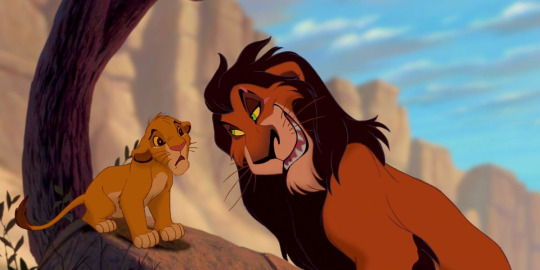
Look at the big-bad-greats from Disney's library. There isn't a point in the Lion King where we pause and think, "Wait a second, maybe Scar should be the guy who rules the Pridelands." Ursula from the Little Mermaid, though motivated by her banishment from King Triton's Seas, never seems to be the right gal for the throne. Maybe Maleficent doesn't get invited to the princess's birthday party, but we don't watch her curse a baby and think, Yeah, go curse that baby, that's a reasonable response to getting left out.
What do they all have in common? Their motivation is simple, their goal is clear, and they don't care who they hurt in pursuit of what they want.
Magnifico simply doesn't fall into that category. He's motivated by the idea of losing power, which is never a clear or impactful threat. His goal at the start seems to be to protect Rosas, then it turns into protecting his own power, and then-- once he's corrupted-- he wants to capture Star. The problem is, there's no objective to put this power toward. Power for power's sake is useless. Scar craves power because he feels robbed of status. Ursula believes the throne is rightfully hers. Maleficent wanted to make a statement. Magnifico... well, I'm not really sure.
1K notes
·
View notes
Text
Not going to apologize for the person I will be when Percy Jackson comes out next week
#the special interest is BACK baby#it never left but I was able to reign it in a bit now there is NO holding back#I’m seeing the early reviews and honestly literally crying this is all I ever wanted#pjo#percy jackson#pjo disney+
1K notes
·
View notes
Text
Disney's been hitting me in the religious trauma a lot lately and I don't appreciate it.
4 notes
·
View notes
Text
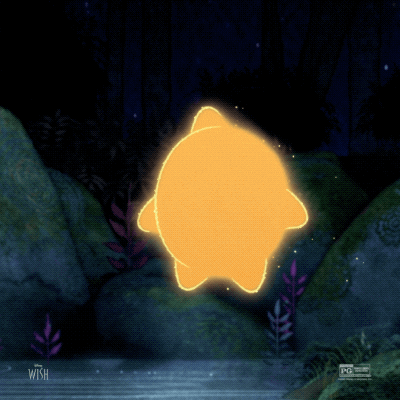
⭐~ Star ~⭐
#disneynerdpumpkin#disney#disney wish#wish disney#wish 2023#wish#wish star#star#so cute#cute#adorable#asjfknsfiquw9rqwpofnfa#only one more day!!!!!!#already bought tickets#so adorable!!!!!!!!#so sweet#so precious#aww#i plan to write a Wish movie review post after i see it so keep an eye out!#i thought that star was a girl smh#but he's a boy#he so cute tho#Headcanon: he and the Blue Fairy are “co-workers” and Star just runs the whole show and Blue helps#like Star loved Geppetto's wish and he was like “hey Blue go and help me grant this wish this guy deserves it”#AHHHHHHHHH#I CAN'T WAIT#I'M OBSESSSED HELP#WHY'D THEY MAKE HIM SO CUTEEEEEEEEEE#ksfnlkasnflijsorj opwqjro ;qwpjpjq;wfn;lqem;fonqwf#top post
375 notes
·
View notes
Text
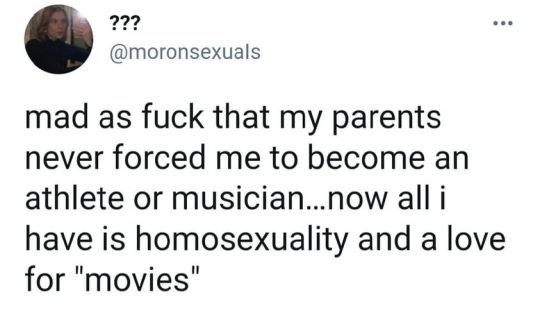
#homosexuality#lgbtq community#lesbian#lgbt pride#lgbtqia#lgbtq#nonbinary#sapphic#queer#disney movies#nonbinary lesbian#gay girls#the lego movie#put me in a movie#nope movie#film#movie review#movie gifs#cinema#movies#rwrb movie#filmography
3K notes
·
View notes
Text
Muppets Haunted Mansion (2021) Review
Muppets Haunted Mansion (2021) Review
Surprise, you’re getting another Halloween review because I couldn’t wait another 365 days to talk about my favorite spooky special in recent years.
Muppets Haunted Mansion (or as I sometimes call it, “Muppets Most Haunted”) is one of those features that feels tailor-made me. It combines three things I love: the Muppets, Halloween, and the beloved Disney ride The Haunted Mansion. If you’re…
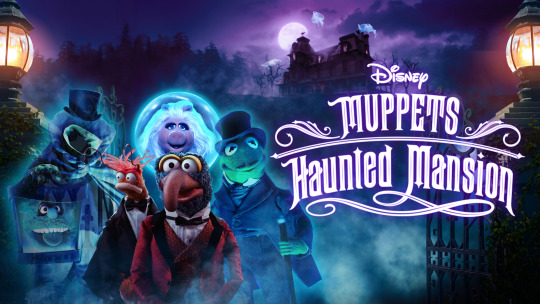
View On WordPress
#adventure#Alfonso Ribiero#ballroom ghosts#Bill Barretta#Black Widow Bride#brian henson#bride#caretaker#comedy review#Constance#Constance the Black Widow Bride#Danny Trejo#darren criss#dave goelz#Dead Tom#Disney#disney muppets#Disney Plus#disney review#Disneyland#doom buggy#ed asner#film review#Fozzie Bear#Ghost Host#gonzo#Halloween#Halloween movies#haunted#haunted house
4 notes
·
View notes
Text
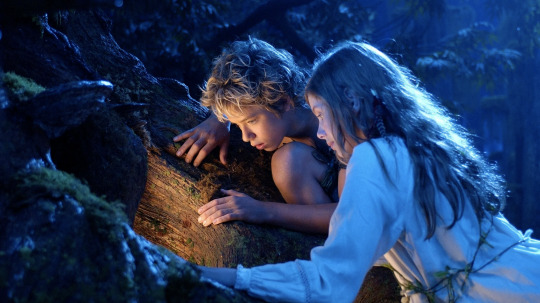
P.J.Hogan's 'Peter Pan' is still an underrated masterpiece 20 years later
Peter Pan is a live-action fantasy adventure film directed by P. J. Hogan that reimagines the classic story of Peter and Wendy. The screenplay was written by P. J. Hogan and Michael Goldenberg and was released in cinemas in December 2003. The screenplay is based on the 1904 play Peter Pan, or The Boy Who Wouldn’t Grow Upand the classic novel Peter Pan by J.M.Barrie, which was originally published under the title Peter and Wendy.
The film tells the story of a young Edwardian girl, Wendy Darling (Rachel Hurd-Wood) and her two younger brothers John and Michael. On the night she is told she must grow up, a wild, fairy-like boy called Peter Pan (Jeremy Sumpter) flies into her room with his high-maintenance fairy Tinkerbell. When he learns that she tells stories, he whisks Wendy and her two brothers away to a magical Island called Neverland — where you supposedly don’t “grow up” — so that she can mother his henchmen, the Lost Boys. There she fights pirates led by the evil Captain Hook (Jason Isaacs), meets mermaids, dances with fairies, falls in love and grows up.

I have strong family connections tied to Peter and Wendy and J.M.Barrie. My great, great uncle Nico was one of the sons of Sylvia Llewelyn Davies'. He and his other brothers "the Lost Boys" were adopted by J.M.Barrie; which ultimately inspired him to write Peter Pan. Nico’s daughter Laura — my cousin — who I met for the first time a few years ago, told me that she was flown to Australia for the filming of P.J. Hogan’s Peter Pan because she was J.M.Barrie’s goddaughter. She told me that she was thrilled with the cast, especially Jason Isaacs, who played Captain Hook and Mr Darling. She also mentioned that Jeremy Sumpter, who played Peter Pan, was a lovely boy. However, she said she was very surprised and sad that the film wasn’t a big success as she really liked what they did with the story. I have loved the fairytale of Peter Pan from a young age, and learning that I am literally part of the family that inspired the story was very exciting and I’ve only begun to internalise it more as I’ve grown older.
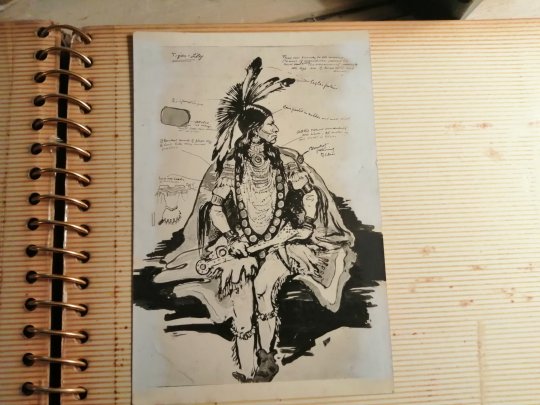
When I was in my mid-twenties, I was diagnosed with a high level of Autism. One of my main symptoms was labelled “ageless”, which in simple terms means that one half of me is still a child that I can’t mentally leave behind. I can’t do many things that most adults can do, such as pay bills, drive a car, look after my own well being etc. I flap my hands when I get excited. I bounce. I sometimes speak in a baby voice. I overcommit to things I enjoy. I admit that it was hard to come to terms with the diagnosis when I first received it. But over time, I’ve come to believe that the two can coexist in a healthy way. I believe that I am an adult who is able to develop and grow while still carrying the child within me, and that this is not seen as a bad thing. I think Peter and Wendy can be seen as a reflection of that.

I was first introduced to P.J. Hogan’s Peter Pan a few years after it was released (I was maybe nine or ten years old), and I absolutely loved it. It wasn’t only one of my favourite film adaptations, but one of my favourite movies of all time. What surprised me most about the film at that age was how dark and gruesome it was, and full of this underlying sexual tension that I hadn’t expected at all from Peter Pan. Even today, this film still has a special place in my heart. It is made with so much passion and love for the original text that I can automatically put myself back into the story. After watching the film again as an adult, I almost immediately opened my copy of Peter and Wendy and started reading. I would even go so far as to say that I prefer the film to the book. However, part of me wishes that the age rating had been set much higher, as the dark and gruesome moments were some of the strongest parts of the film adaptation. This is possibly why some critics and viewers had difficulty categorising the film at the time.
However, I often consider P.J.Hogan’s Peter Pan to be the same equivalent as Joe Wright’s Pride and Prejudice. (which came out a few years later in 2005, starring Keira Knightley and Matthew Macfadyen). The film moves at the same dreamlike pace. It is light, dark, colourful and deeply romantic.

I also often prefer P.J.Hogan’s Peter Pan to the 1953 Disney Animation of the same name, even though it’s the version I grew up with and liked. I find it much less straightforward and innocent. Also, the 2003 film is much closer to the original source material, which I loved reading as a teenager, and to J.M.Barrie’s original vision. The film manages to reflect the same intellectual subtext and depth of the novel while retaining the whimsy and magic.
Magical Realism

Peter Pan was a perfect blend of fantasy and realism. A lot of media these days focus too much on “realism” and make their sets and CGI look bland and washed out. It’s a common myth these days that no one likes whimsy anymore; it’s somehow seen as too childish. As a result, much of the magic of fantasy is lost. But in this Peter Pan, a lot of colour was used in the set design and cinematography. Everything was so brightly and colourfully lit. Most fantasy films these days, including the new live-action adaptation of Peter Pan and Wendy on Disney+, are all so gloomy and dark. You almost have to light up the screen to make out the actors’ facial expressions or what’s happening in the scene. But this film understands that a viewer who watches fantasy wants to be swept away, but also wants a certain amount of believability. Although the film contained a good amount of darkness, it did not shy away from being cartoonish either (which I think was partly inspired by the Disney animation), i.e. characters blushing or bouncing on the clouds.
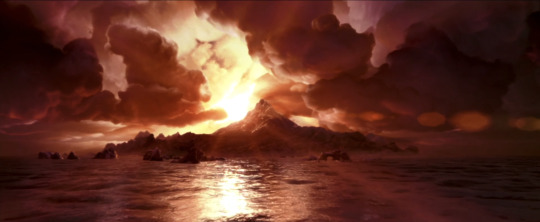
The design of Neverland was breathtaking. I think the CGI, although criticised by some, made the island and creatures look more dreamy and fairytale-like. It was a good combination of CGI for the landscapes and real backdrops for the jungle, so there was enough magic and believability to transport the viewer into the story. A bright colour palette was used for the landscapes, while down-to-earth colours such as browns and greens were used on the ground, such as in “The Lost Boys Hide” under the tree, to give a sense of realism. The costume department also reflected this, from the majestic reds and blacks of the pirates, to the earthly colours of blue and red for the Native Americans, to the natural greens and browns of the Lost boys. I noticed that the colours in Neverland were used as a contrast to the Edwardian London back home, which is realistic but dull compared to the island.
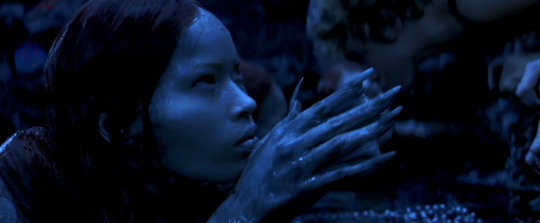
One aspect I liked was that the lighting on Neverland always changed depending on the mood of the scene- unlike the naturalistic lighting on Earth. It was almost as if the island was a living being. For example, when there was a fight on the ship, the lighting was red. When Peter took Wendy to the mermaids, who were scary and frightening, the lighting was dark and blue. This created a surrealistic atmosphere, almost like a fever dream or a kind of nightmare.
Sometimes the environment changed depending on Peter Pan’s mood in the respective scene. I particularly liked how Peter Pan influenced the weather on Neverland. Just his mere presence when he flew to the island changed the entire atmosphere in an instant. His feelings also determined whether it was summer or winter. In other words, its suggested in the film that the longer he has been there, the more the island has become a part of him, so that he can no longer leave it. It’s almost as if the island has transformed him into a magical being.

The exuberant musical score by James Newton Howard: I’ll never forget that. I think that was one of the first movies I saw where I actively noticed the music because it was so brilliant. Even today, the “Flying” soundtrack still gives me goosebumps. It perfectly encapsulates the whimsy, joy and imagination of Peter and Wendy. I loved that there were always different variations. One of my favourite pieces from the movie is ‘Fairy Dance’, which starts off cheerfully and moves up and down depending on the characters’ conflict/what they’re saying in the scene.
Cast
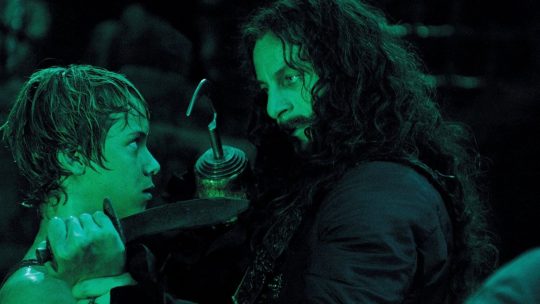
The cast of this film adaptation was magnificent. The look of all the actors not only matched the book description, but also the mood, especially with the Darling family. One of the standouts was Olivia Williams as Mrs Darling. She captured the gentleness of the character perfectly. I also loved the new addition of Aunt Millicent, played by Lynn Redgrave. She fitted into the story so well that I was surprised not to find her in the novel. She had the perfect amount of ridiculousness and hilarity that suited J.M.Barrie’s style.
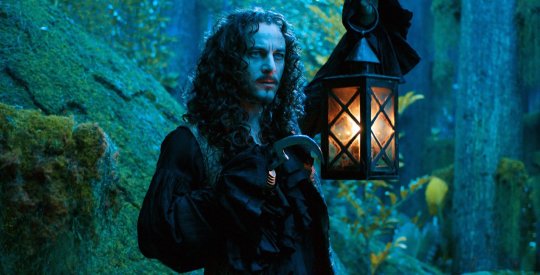
One particular member of the cast we can probably all agree on that was perfect, was Jason Isaacs, who played both Wendy’s father Mr Darling and Captain Hook. He was certainly a star in this film for sure. I just can not think of anyone who could play him better, especially in a live-action film adaptation. He was particularly good in the role of Captain Hook. When I first saw the film as a child, I did not know that Captain Hook and Mr Darling were played by the same person until my dad pointed it out to me because he was so good. I loved how they portrayed Wendy’s dad as shy and reserved, as opposed to Captain Hook who was flamboyant and sinister. Mirror versions of each other in different realities — that’s a common theme throughout the film. As Captain Hook, Jason Isaacs perfectly captured the essence of viciousness, deviousness and brutality that was necessary for the character. But also the deep loneliness and frustration behind it all. I have seen a quote that was supposedly cut from the film (and never should have been) that provides so much context for his hatred of Peter Pan:
“Imagine a lion in a cage and into that cage flies a butterfly. If the lion was free, it would pay no heed to such creature. But the lion is not free…and so the butterfly drives him slowly insane.” — Captain Hook
They did a really good job of showing how Peter Pan and Captain Hook are mirror images of each other. Peter Pan is a child who secretly wants to be an adult, while Captain Hook is an adult who secretly wants to be a child. Both fight each other for different reasons, but the goal is the same. For example, there is a great scene towards the end where Captain Hook uses his wits to defeat Peter in a fight. Here it becomes clear that there is deep symbolism for the inevitability of adulthood and the loss of childhood. Jason Isaacs really showed off his acting talent here. I liked that he wasn’t portrayed as a “dumb villain”, which he easily could have been.
There were also some great performances among the adults. Most notable was Richard Briers as the ‘pirate’’ Smee. But the child actors, especially the lost boys, really held the movie together. Their solid performances made it so believable that the island was ruled by children. I loved Theodore Chester as Slightly. He was very charming and funny in that role.
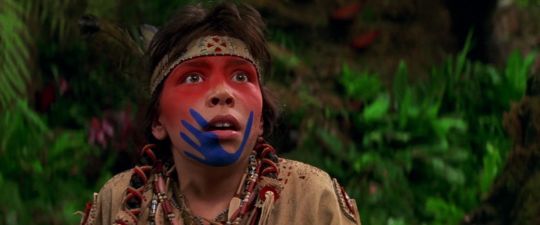
Another member of the cast I thought was brilliant was Carsen Grey, an indigenous actress of Haida descent, who played Princess Tiger Lily. I liked that they let her speak her ancestral language, Mohican, in this film. Although this film came out in the early 2000s, it is the only version of Peter and Wendy in which Native Americans are neither erased nor white-washed even though the representation is far from great. Considering how they’re treated in the novel, it’s perhaps for the best overall that they limited some of their scenes. However, I liked how firey she was in this adaptation and not the damsel in distress she was portrayed as in the Disney animation. I think it was a wise decision to cut the infatuation she had with Peter Pan, as it was really just one line in the book that would have added unnecessary drama, and all in all, it would have fallen short if all the female characters were jealous of each other.
They also downplayed Tinkerbell’s jealousy in this regard, portraying it more as her trying to protect Peter Pan’s youth from romantic advances, as hinted at in the novel, and also being sad that Wendy is attracting all of Peter Pan’s attention. Ludivine Sagnier has, in my opinion, succeeded well in making Tinkerbell equally repulsive and endearing, as befits the character.
Wendy Darling
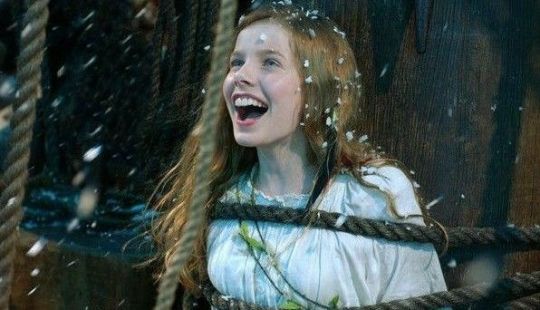
Rachel Hurd-Wood was the perfect cast for the role of Wendy Darling.I was actually surprised to learn that this was her first film role ever, because she was a natural. She effortlessly possessed the same caring nature and charm that makes Wendy so endearing. She is exactly how I imagine the character when I read the story. When people talk about Peter and Wendy, they always mention Tinkerbell, Pan or Hook, but personally I am always drawn to Wendy. She is the real heroine of the story. After all, she was the main reason for Peter to bring her and her brothers to Neverland.
What always amazes me about Wendy’s role in the story is the fact that Wendy literally doesn’t spend much time being a “child” in the time she spends in Neverland. When she’s not escaping death at the hands of mermaids or pirates, she acts as a mother to the ‘lost boys’ and her brothers. She asks herself what she really wants from life. In comparison, she was allowed to behave more like a child at home in Edwardian London. Neverland is not a place where you never grow up. It’s the place where she chooses to grow up. Many people have described Neverland as a manifestation of Wendy’s subconscious as a result of trauma, and I’ve never found that to be more true in this adaptation.
One of the reasons why I think P.J. Hogan’s Peter Pan is the best adaptation of the novel is the fact that the film revolves around Wendy’s coming of age. I loved that they expanded on her love of storytelling and also gave her a tomboyish streak. Instead of just being on the sidelines, she’s able to get involved and fight pirates while retaining many of her feminine traits such as her maternal instincts and romantic feelings for Peter. She makes mistakes and sometimes gets dragged into things she knows she shouldn’t do. But in the end, she triumphs.
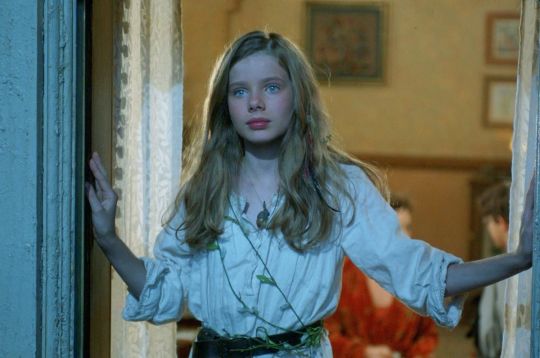
In many film adaptations of Peter and Wendy that I have seen, Wendy is either only present in passing or not at all. Characters like Peter Pan, Captain Hook and Tinkerbell always take centre stage, which I think is a strange decision as they are part of Wendy’s story and not the other way around. Peter Pan is meant to metaphorically represent the childhood she does not want to give up (which is why the character is always played by a woman in the original play, as he is a mirror image of Wendy). And Captain Hook (J.M.Barrie also wanted him to be played by the same actor as Mr Darling) represents the dark side of her father, or rather what she imagines adulthood to be. This is particularly emphasised in this film adaptation because he is an important factor in her being told to grow up. The father, the concept of adulthood, and Peter Pan, her childhood, are at constant war with each other.
“You’re not supposed to be like Peter, who kept every good and bad aspect of being a child and can’t tell right from wrong. You’re not supposed to be Hook, either. He let go of everything childish and loving about him and became bitter and evil..You’re supposed to fall in the middle, to hold onto the things about childhood that make it beautiful — the wonder, the imagination, the innocence — while still growing up and learning morality and responsibility. You’re not supposed to be Hook. You’re not supposed to be Peter Pan. You’re supposed to be Wendy Darling.” — @maybe-this-time
The 2023 film Peter Pan and Wendy took a different approach, by making Wendy a kind of powerhouse who always saved the day and outshone Peter Pan overall. In my opinion, the 2003 film adaptation emphasised very well that Wendy really is the yin and yang. She's allowed to be romantic, be rescued by others and at the same time determine her own destiny and stand up for herself. Because that’s what her journey in the adaptation is all about. She is pressured by all the adults in her life to grow up. She allows herself to be seduced with the prospect of an eternal childhood by Peter Pan. Then she realises that it is not self-fulfilling. She is tempted by Captain Hook with the concept of adulthood. And finally, she finds a balance between these two extremes on her own terms. By the end of the film, Wendy has made her peace with growing up while still remaining a child at heart. That requires a certain mental strength that we should all strive for.
Peter Pan and Wendy Darling
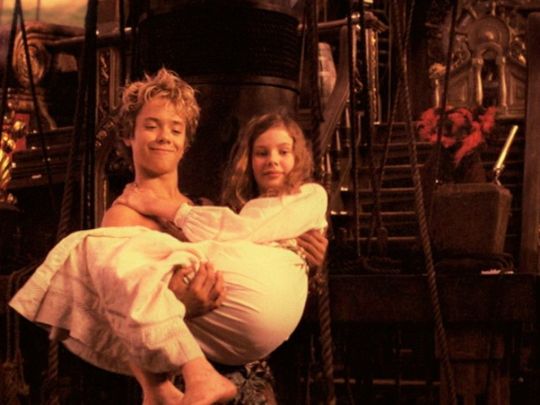
In most adaptations of Peter and Wendy, such as Hook and Syfy’s Neverland, the focus is on the title character Peter. In the more recent film adaptation Peter Pan and Wendy, the focus is on Wendy. This film adaptation of Peter and Wendy, on the other hand, sticks more closely to the original source material, as the story focuses on Peter and Wendy’s relationship. This is perhaps the reason why I always hesitate when I watch other adaptations, because these two characters are supposed to go together. It’s definitely a relationship that can be portrayed in all sorts of ways because they are symbolically the same person.
Although there is no romance between Peter and Wendy in either the original novel or the play, Wendy quickly develops romantic feelings for Peter which, as a prepubescent child, he does not consciously reciprocate as he has no concept of love other than that of a mother’s. Although Peter cares deeply for her, he ultimately only longs for her to be the maternal figure that is missing in his life. One could go into the symbolism that Peter and Wendy are one and the same, and that this is an expression of Wendy learning to love herself. But in a literal sense, J.M.Barrie had unintentionally created this very strong potential between the two characters. And I personally feel if your'e going to make an adaptation of Peter and Wendy that potential needs to be explored in some way, even if it’s not necessarily romantic.
Hogan recognised this potential and developed the romantic elements, e.g. ‘the “thimble” from the novel, into a very real and tangible plot. In other adaptations, Peter and Wendy’s relationship is rather one-sided. But in P.J. Hogan’s film adaptation, however, it is not at all. Over the course of the film, Peter and Wendy fall deeply in love with each other.
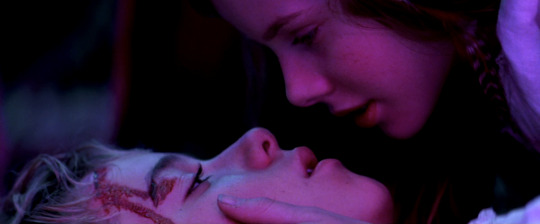
Rachel Hurd-Wood and Jeremy Sumpter had a remarkable on-screen chemistry for young actors, which helped give the adaptation its own identity. Whenever they interacted on screen as Peter and Wendy, it was — like the glittering pixie dust of Tinkerbell — simply magical. The off-screen chemistry between the two definitely helped make the romance so believable as well. When I was younger, I didn’t like romantic subplots in family films. I personally found that they clogged up the main plot because the “romance” tended to be very one-dimensional- but Peter and Wendy in the 2003 film version were simply enchanting.
In the original novel, J.M.Barrie alludes to the possibility of a romance between the two. In the film adaptation, they go all out. Their love story was written so beautifully and profoundly, while staying true to the original text and J.M.Barrie’s themes. This made the conflict hinted at in the novel of “staying in Neverland with Peter or growing up on Earth with Wendy” even more poignant and relevant, because in reality there was only ever one option. They couldn’t find a way to have both. That made the ending even more “heartbreaking” for me as a child, because even though they had the chance to be happy together, she couldn’t give up on growing up to stay. And he couldn’t give up being a child to leave, even though it was a natural progression for him.
Peter Pan
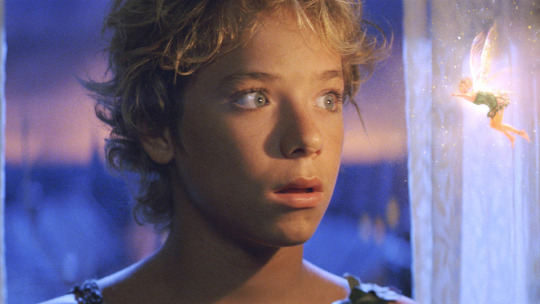
Jeremy Sumpter delivered a fantastic performance as Peter Pan. Not only did he perfectly match the illustrations, but he also managed to perfectly capture the essence of the charismatic, mischievous little boy from the novel. What’s more, of all the versions I have seen so far, he is by far the most accurate, right down to the clothes made of skeleton leaves, the dirty fingernails, the feral mannerisms, the traumatised soul behind the charm and the downright creepy insinuations. By today’s standards, you could almost take Peter Pan for a grown man who consciously decides not to behave like this.
However, when I watch the film again as an adult, I can now understand why he has reservations about growing up in Edwardian England and would rather remain a “child” in Neverland forever. As Peter says in the film, “Would they send me to school? And then to an office?” I feel like most of us today have so many choices as we get older, but back then it was much more limited. The choices were very restricted in that “heterosexist” environment. You could only be a certain thing, and it was much harder to hold on to the pleasures of life. I can now also understand the initial reactions of Michael and John to Peter: He must have seemed scandalous to people at the time. His bright colours, his inappropriate clothing and his behaviour are repulsive to the boys, but Wendy is immediately fascinated and attracted. I think it was a deliberate choice that he is the only character with an American accent to set him apart from the rest of the cast; to emphasise the wildness of the character and his non-conformity to the people of Edwardian London.
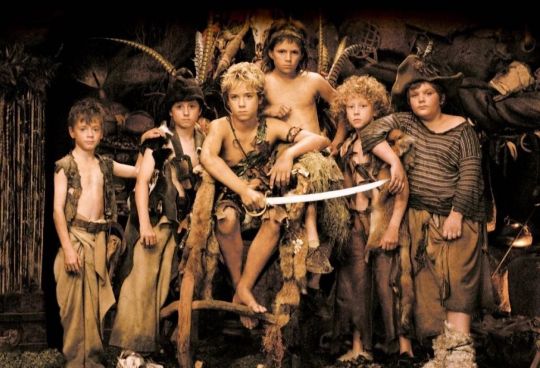
Another small aspect I liked was the suggestion that the Lost Boys, although they lived with Peter and obeyed his commands, lived in constant fear of him and did not worship him as in other adaptations. (A fear that is justified as Peter tries to kill them more than once in the film). What the 2003 film adaptation captured perfectly about Peter's character was: how terrible of a person he really is. Peter Pan is a hero when he goes on adventures and fights pirates. You could argue — via the quote “Leave Hook to me” (which Peter says to her in the film) — that Peter is Wendy’s split self who can fight her father (Captain Hook) for her, just like antibodies do with germs when we can’t handle them ourselves.
However, when it comes to understanding emotions, caring about others, even his henchmen, the Lost Boys, and doing anything that inconveniences him, Peter Pan is possibly as bad as Captain Hook. This makes Wendy’s decision to leave him all the more powerful. Although she was initially seduced by his adventurous life, she soon realises that his “life” of joy and adventure is not fulfilling at all. Because in reality, there is no real joy. There is no real adventure. In reality, his life is empty because it is not earned. In addition, she realises that she is gradually losing her memory of the outside world, including her parents - a sign that she is “slowly awakening from the dream”. This leads Wendy to realise that she wants more than what he can give her in Neverland (e.g. romantic love) and decides to leave. Being alive means feeling, accepting and growing. However, as long as Peter remains a boy, he can never truly be alive. Peter Pan conveyed this important message, whereas earlier film adaptations, including the Disney animation, did not.
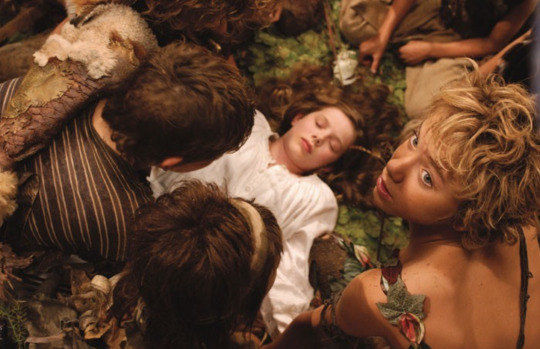
One of the reasons why good adaptations of Peter and Wendy are so hard to come by, especially in this day and age, is not only because they adapt a performative story that exists in layers of subtext. They also work with a protagonist who doesn’t change. Who doesn’t develop in any way, neither negatively nor positively. Not even just physically, but also mentally. (Even Eli from Let the Right One In, the child vampire, changes in the course of the story). At the end of day, Peter Pan is ultimately there to serve someone else’s story. It works in a fairy tale format. But it doesn’t usually translate very well to the screen because it often leads to one-dimensional storytelling. Even if it seems so natural, it doesn’t come naturally.
However, this adaptation allows Peter Pan to grow. The writers expanded on the small aspect from the book, which is the moment when Wendy enters Peter’s life; he begins to feel emotions. Not just love. But anger. Fear. Sadness. Pain. Disgust. And above all: self-awareness. Almost like a version of puberty in condensed time, as if the change suddenly caught up with his body. When Wendy brings this up, Peter immediately rejects it out of fear. I think most of us can all relate to this when we were in the midst of growing into a young adult. We experience feelings that are scary and new, that we can’t yet fully understand or even want to. For Peter Pan, falling in love is exactly what he is afraid of: growing up and no longer being a child. This adds to an interesting conflict that arises between the two when she asks him to leave with her.
“The thing about Peter Pan is, he’s a coward. Had the chance of a lifetime and he bottled it. Just fucked off back to Neverland. All alone, forever he was, by his own hand. Poor old Wendy, she had to grow old without him.” — Skins, 6x07 “Alo”
In the original novel, the reason Wendy can’t take Peter Pan with her (apart from the fact that he refuses to grow up) is the same reason Lyra in His Dark Materials can’t take Pan — the animal manifestation of her soul — on the boat to the land of the dead. She has to split in order to grow up and leave a part of herself behind. She can’t keep both in order to move on. But that does not mean I always agree with the ending either. In which Peter remains a child and takes Wendy’s future descendants to Neverland and back to look after him. It leaves an icky aftertaste, but at least it fits in with the story J.M. Barrie wanted to tell.

Even though the adaptation conveys the same message, that Peter Pan is the manifestation of Wendy’s youth, even to the end. In this version of Peter Pan, that is no longer the case. By the end of the film, the way he holds himself is different. The way he looks wistfully through the open window and solemnly says, “To live would be an awfully big adventure,” : a sign of self-awareness, while Wendy happily reunites with her family. So much so that Tinkerbell has to pull him by the hair to stop him from joining them and reconsidering his decision. Peter is now old enough to know that he loves Wendy. Maybe he’s also mature enough to know what he’s missing, but he knows he can’t have her the way he wants, so he does the most selfless thing he’s ever done in the whole film by letting her go.
There is no such conflict at the end of the 1953 Disney animated film. Peter Pan is described by Wendy as “wonderful”. In reality, everyone else gets their happy ending, except him, because he deliberately chooses not to. Peter Pan very much turns himself into a tragic figure because he is afraid of the most natural thing in the world. He is afraid of life. And I feel like this version of the story knew that and expressed it strongly, which makes me conflicted now as an adult. I’ve seen endings like this before, where two people fall in love but do not end up together because they grow apart or they are both interested in different things, and it’s very important to reach those points in different ways. It very much reflects real life and is also reminiscent of first love. How that love never really fades. It reminds you of simple times, even when you’ve grown up and moved on. That a part of you is still at that age when you look back on it. These endings happen because people grow — which Peter Pan does not.
“Peter in the books lives in oblivious tragedy. He may suspect that he’s not fully happy, but he tends to forget about it… yet this Peter doesn’t… Wendy leaving him and growing up to be a wife of another man is his unhappy thought…It’s the loss of innocence since Peter could not forget this…It’s the process of growing up…all but confirms that Peter’s character arc in the film is one of accepting the fact he too must grow up to be happy.” — @rex-shadao
And I think that’s the real reason why his character is both the strongest and the weakest part of the adaptation. The writers didn’t make it clear enough that Peter Pan forgets in their version of the character. In the novel, Peter Pan forgets everything automatically, which is why he can exist in this limbo of childhood and not go mad. However, as mentioned earlier, this version of Peter Pan is old enough to remember and, more importantly, to feel. Even though he is the closest to J.M. Barrie’s original vision, unlike his counterpart in the book, he is capable of evolving. That’s why the ending sometimes feels strange to me as an adult.
It was hard to say why I had a strange feeling at first, but I realised that a lot of my mixed feelings stemmed from having seen the film adaptation fresh after reading the novel. Since Peter Pan fully reciprocates Wendy’s love in this version, he ends up being a different character than in the book, which is why I now disagree with them keeping the original ending instead of having him grow up with Wendy. It would symbolise that childhood can co-exist with adulthood, that you don’t have to leave a part of yourself behind. That you can be your true and complete self if you find the balance between the two extremes.
The original ending still works however, in all its bittersweetness. I know what it means and understand what it stands for. Wendy basically says goodbye to her childhood and promises never to forget it. There’s a reason it made such an impression on me when I was younger. It could just be because I’m trying to pick up all the pieces of my broken heart from the floor. But personally, as an adult, I just find it weaker compared to the novel. Sometimes I like to imagine an ending to this version of the story where Peter Pan comes back, having quickly realised that he has outgrown Neverland, but doesn’t meet Wendy again until they are both much older, at a time when Wendy is coming to terms with womanhood and the idea of marriage. Or she even meets his real earth counterpart (if we were to delve into the psychology of Neverland being Wendy’s dream). And their relationship is subjected to the natural test of time and growth.
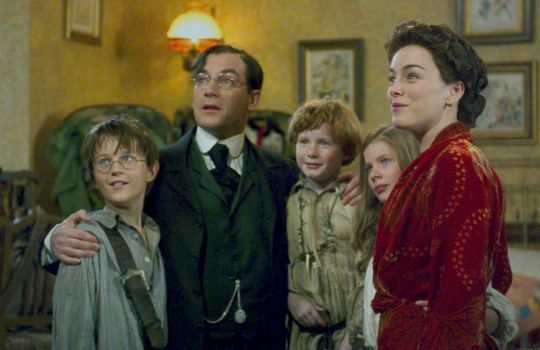
Peter Pan is an almost perfect adaptation. It matches the humour, the tone and the vision of J.M.Barrie. But I can certainly understand why the film didn’t do so well at the box office. In the month it was released, there was an unfair amount of competition, namely the film Lord of the Rings — The Return of the King. And as an adult, I can now understand why it’s not the film people think of or remember when it comes to Peter Pan adaptations. And it’s not just because it doesn’t fit the elfish, jolly trickster persona that Disney has created.
The film adaptation suffers more from what it doesn’t do — such as maintaining a stable tone and consistent editing — than from what it does. It’s one of those films that would have benefited from being much longer. That way, the inconsistent tone and some of the rushed parts of the adaptation would be much more balanced. It feels like it was missing an extra twenty minutes. For example, the film is narrated by an older version of Wendy, but without the deleted ending where it becomes properly clear that it’s her telling the story to tie everything together, the ending feels a little abrupt. Say what you will about Tim Burton’s adaptation of the Series of Unfortunate Events, but the audience could see where the film’s narration was coming from the whole time. I think if they knew the alternate ending wasn’t going to work (that scene is a classic example of something working well in the novel but not in the film), they should have removed the narrator altogether with the deleted ending and adjusted the film accordingly. They should have extended some scenes so that parts of the film weren’t rushed, such as the introduction, and the story would have been left more up to interpretation as there was no voiceover throughout.
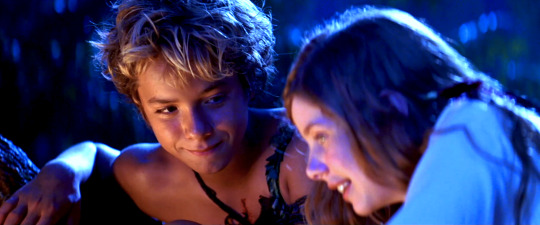
Despite its weaknesses, P.J.Hogan’s Peter Pan is still an underrated masterpiece 20 years later. It is an irresistible film that captivates and warms the heart. The film adaptation has certainly stood the test of time, staying true to the original while adding its own flavour to the story. It is full of magic, wonder and heart. It was clearly made by people who loved the origins of the story and explored where they came from, while also digging deep into the text to reshape the character arcs in a fresh and meaningful way. They succeed in capturing J.M.Barrie’s original message, which is that growing up is a natural progression of life, but that doesn’t mean leaving childhood behind entirely. That it is important to maintain a healthy balance between the two: Taking responsibility while appreciating the joys of life. From the vibrant colour palette to the goosebump-inducing music to the solid performances and gorgeous chemistry between Jeremy Sumpter and Rachel Hurd-Wood, my love for this adaptation will never end, no matter how old I am.
#peter pan#peter pan 2003#jason isaacs#jeremy sumpter#rachel hurd wood#peter and wendy#j.m barrie#peter x wendy#wendy darling#analysis#tinkerbell#captain hook#disney#peter pan and wendy#disney +#hook#James Newton Howard#olivia williams#novel#classic literature#filmmaking#film#cinema#culture#movie review#darling pan#finding neverland#film review#peter pan (2003)#peter pan live action
202 notes
·
View notes
Text
Yeah, again, you can tell that the creators of Wish wanted certain moments to be impactful and to hit as hard as any other animated Disney movie’s moments did. But they didn’t. Because there was no convincing build-up for the moments to peak on.
You can tell which moments they are.
When Asha and the King sing “At All Costs” - If you listen to the song on its own, and you have no context (which is to say, you make up the context on your own) it is moving. Because it’s a pretty-enough song with vaguely passionate lyrics, once you assign meaning to them. But the movie doesn’t build up why this song should be an impactful declaration for either Asha or Magnifico. We already knew that Magnifico made it his job to “protect” the wishes (which are the subject of the song.) Asha, on the other hand, has only just been introduced to us, and we know she “cares too much,” so we already knew she’d protect people’s wishes. The song isn’t giving us a deeper understanding of them, or a more interesting angle to look at their motivations.
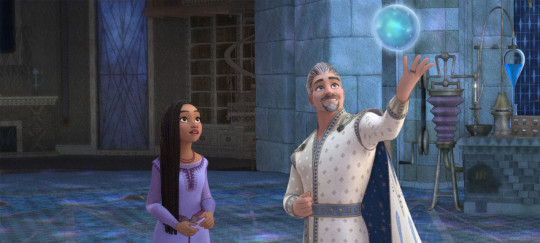
But, that’s not really the problem. The problem is that the wishes are the subject of the song. And that whole concept, of wishes being tangible objects that hold the most important and beautiful part of people’s hearts, but when they’re tangible, they remove that part from the person, is bad. It’s not good to try and build a story of stolen-treasures on.
Because that’s how they’re treated. Like treasures that the king is hoarding, after manipulating the people of Rosas into giving them up. And you know what? That’s a terrible thing to sing a protective love song to.
Just think about it this way: the story is about a King who takes everyone’s favorite keepsakes (family jewels, ornaments, old photos) and promises to protect them, but in actuality…for some reason…the moment they hand the keepsakes over, they forget whatever made the keepsake important to them. And then the King and a young woman sing a heartfelt song to the photographs and old brooches about how they will love and protect the photographs and old brooches.
Do you see why this song is pretty but not impactful in the story? They shouldn’t be singing to the wishes. Even Magnifico. They should be singing to the people. The movie plays it as if that is what they’re doing—singing a heartfelt promise of protection to a person, or a people. But that’s not what they’re doing, and do you know why?
Because the people have forgotten their wishes.
By definition, the actual human beings in Rosas cannot care (believably) about the bubbles in King Magnifico’s tower. They can only vaguely care about the chance of being happier than they are now, someday, if the wish they don’t even remember is granted. And what a terrible lesson, never mind plot point.
Anyway.
I digress. The point is, for a personally-worded, vow-of-protection-song to hit the audience meaningfully, it needed to matter to the person receiving the vow. But there is no person receiving the vow. Because of the narrative and lazy concept, only Asha and Magnifico care this much about the wishes. Because the people who made them have forgotten them. (More on this when I talk about Asha’s mom.)
When Sabino’s wish is not granted - This is supposed to be like a “Tiana’s restaurant gets taken away from her when she’s outbid” moment. The character is crushed when the thing they wanted and really believed they would finally get is taken away.
Doesn’t work in Wish, though. Because of a few things, but the main two are:
The audience has no reason to believe this means so much to Sabino because he hasn’t been shown really longing for his wish to come true.
This movie avoids any vulnerable emotion in facial expressions.
When Tiana loses her chance to have her wish come true, it is also unfair—she was already promised the property, but the brokers accepted a larger offer anyway, and it’s implied to be because of racism. Similarly, everyone acts like Sabino is entitled to (“promised”) having his wish come true because he’s so old and it’s his birthday. Plus we, the audience, know that Magnifico isn’t rejecting his wish for good reasons, and that Sabino’s wish is unselfish. So it’s meant to feel unfair and sad when he doesn’t get it, but it’s not. Not like it felt with Tiana.
Not only does the lazy concept of wishes and forgetting them once they’re tangible hamstring all of this—but the fact that Sabino has had nothing but a handful of sparse lines (ones like “we don’t know for sure that I’ll get my wish granted”) to convince us that he really cares about this hamstrings it, too.
When Tiana loses her restaurant property, it’s only about 24 minutes into The Princess and the Frog, and we have already had:
1 - A song about how hard she’s worked for it.
2 - An opening scene where her relationship with her father connects the restaurant to a deeper, more personal meaning for her.
3 - Several scenes where she is shown doing drastic things to get enough money for it; her drawer full of tip money; the two jobs she works with only a minute’s sleep in between; her friends asking her to come dancing but reiterating the fact that she often loses time for fun and their good feeling toward her because “all she does is work.”
4 - We are also shown that people don’t believe she’ll get it. The cook at her job mocks her for her wish, which makes it all the more important to the audience that she gets it—to prove the jerks wrong.
Of course, it doesn’t hurt that the restaurant is directly tied to Tiana’s character flaw AND her strengths, at the same time, so that it’s killing two birds with one stone—we’re shown who Tiana is, and we’re convinced to empathize with her when something sad happens to her.
Sabino has zero of those things going for him. No character details or set pieces to hint to us that he wants the wish to be granted so badly—no speeches about what it means to him—no memories tied to how he began to wish for this thing—because there can’t be. Because he’s spent 82 years not wishing. Because he’s lived the majority of his life totally forgetting what he wanted. You couldn’t logically show any evidence that he wanted it that much, then, could you?
So Sabino can’t be shown caring too much about not getting his wish. Therefore the audience doesn’t care either. We’re shown a glimpse of his sad face, and Asha’s sad face, and then told, “now feel sad!” But the work wasn’t put in to make it happen.
They cut their legs out from under themselves.
Now you could say, “well it wasn’t really about Sabino’s disappointment, it was about Asha’s disappointment.”
Yeah, but that doesn’t really hold up either. I’ll explain how in the next moment-that-should’ve-made-us-feel-something failure:
When Asha’s family doesn’t believe her - This scene is very clearly supposed to be like the one where Mulan has an argument with her family about her father going to war, and knowing her place, and he yells at her and she runs out distraught.

You definitely feel for Mulan and care about how she’s feeling in this scene—you might even cringe at the part where her dad yells at her. Part of that is because the scene is so well-done—there’s the buildup of tension as the camera cuts between each family member quietly drinking their tea, refusing to talk about the day’s devastating events. Then Mulan bursts out by slamming her teacup down and starting the yelling, herself, in outrage. Her dad stays quiet and steady like he has the whole movie up till now, so then when he stands up and shouts at her, about the exact thing she has been so upset over since the Matchmaker’s, the audience really feels the impact.
You don’t feel the same way about Asha, and it’s not just because her family argument scene wasn’t done as well—it’s also not just because, as you can see above, the movie keeps tiptoeing away from emotional vulnerability in the way the characters look.
It’s mostly because there’s been no impactful buildup to this scene. Again.
When Mulan has an argument with her father, you know what it means to her to have him yell at her about doing what’s right in her own place—you’ve had the whole first few scenes of the movie to convince you of it.
Mulan is upset because she wants to find her place and she loves her father very much. But she does not, ever, say the words “I love my father so much.” She doesn’t even outright say things like that before the argument. She doesn’t say to the Matchmaker, “Won’t you please give me another chance? My father has been praying about this for weeks, and I can’t bear to disappoint him. My father is a great man; he fought for the Emperor and was wounded in the wars; for his sake, can’t you help me?”
Asha does. Asha says to King Magnifico (but really, to us, the audience) “My grandfather’s wish! It’s beautiful.” And “Your Highness, couldn’t you grant his wish?” And to her friends, and to her mother, and to her grandfather himself—over and over she just reminds us with flat, “okay-we-get-it” dialogue and exposition of what she wants.
Whereas Mulan shows us. She convinces us. She runs up to her father, in the very first scene, and we’re shown that even though she has trouble remembering what she’s supposed to say to the matchmaker—even though she has trouble remembering what time it is and getting her other chores done—with this one part of her life, her father, she can remember exactly what the doctor said about how much tea he needs to drink. And she is prepared for her own clumsiness to make sure he gets it.

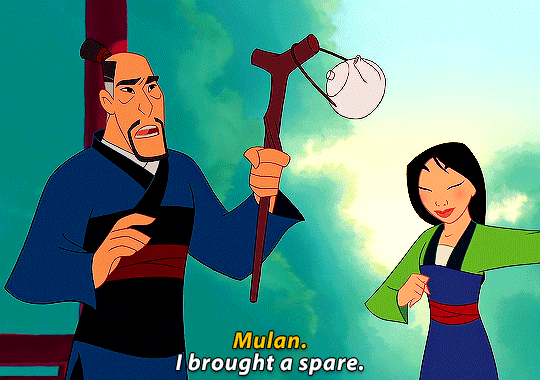
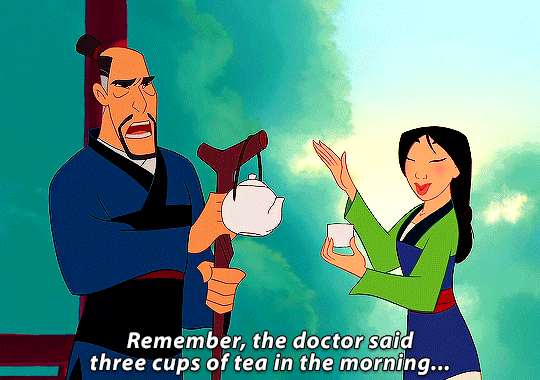
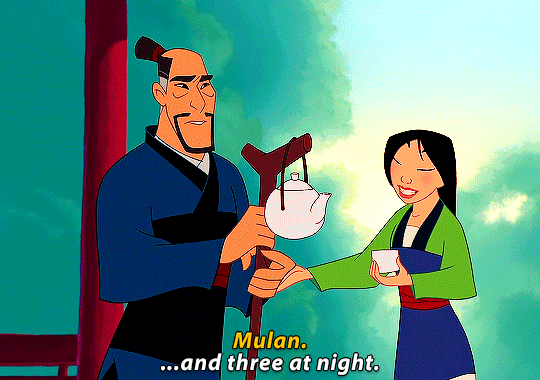
And even after she doesn’t get what she wants, and is shown to be so ashamed she can’t even look at him (because that’s how much she loves him and cares what he thinks) the only thing that makes her feel better is when he carefully compares her to a late-blooming flower and basically promises that he believes in her, anyway. We know how much Mulan cares about her father because we’ve been convinced by the way the movie artfully and carefully shows it.
We also know that she cares about knowing her place, specifically because of her family’s wishes for her. So all of this combines to prove to us that having her father shout at her about knowing his place and why he’s going to die willingly is a devastating thing for her. Enough for her to run out of the house sobbing and cling to a pillar as if she can’t hold herself up.
But when Asha runs out of the house (barely sobbing, just kind of breathing fast, because there’s no vulnerability in this movie) and stumbles up to a tree in the same way, we don’t really believe something so devastating has happened to her.
Everything happened too fast. She just kept saying she cares about Sabino’s wish coming true, and that she loves him. When he explodes at her (and really out-of-nowhere asks if she wants to “break his heart”) it’s the first time he’s shown any kind of intense emotion, either toward her, or about his wish.
There is no build-up. So it just feels awkward, and kind of like a high school production where one of the kids hasn’t even been trying to act, but in one scene, he suddenly starts yelling because that’s what his character is supposed to do. And it’s just cringe because you haven’t seen that level of energy, happy or sad, good or bad, at all up until now.
And that’s a problem because it leads right into Asha’s “This Wish” song, which is supposed to be like her “Mulan riding off to war” moment. But it’s not set up well by the emotions tied to the family argument, or the emotions tied to the conflict with the King, so you don’t really care.
Moving on to the next emotional-moment failure:
When King Magnifico threatens Queen Amaya - I don’t have much to say about this one; I think you’re getting the point. When there’s nothing but bland words and one-liners spoken to convince us that the characters are thinking and feeling how they’re thinking and feeling, moments like this one just feel boring and forced. And try-hard.
Like, the lighting? The music? Fine. Good. When he points his new magic wand at her threateningly, and clearly appears ready to betray her? All that stuff is fine. It just hasn't been built up to, so it doesn’t hit.
It’s like, “that’s it?” He just says one line about, “Are you betraying me?” And she pours forth a bunch of lines like “no I’ve always believed in you and in Rosas.” And then he’s basically like “okay, I’m convinced, moving on” which of course is him already knowing that she’s betrayed him and already having a plan to trap Asha…but still. From Queen Amaya’s point of view, there’s nothing emotional here.

We’re supposed to believe they’re madly in love and that she trusts him wholeheartedly, so that when he falls to dark magic and she chooses to side with Asha it’s this big moment. But it happens so fast.
There’s no moment where Queen Amaya grieves her husband. There’s no real sense of loss, or even of impactful betrayal. The voice actress delivers every line like she’s trying and failing to feel what the character feels as she reads the lines to a 5 year-old who needs every concept spoon-fed to them.
And King Magnifico drops her like a bag of dirt instantly. No sense of loss from him, either. He’s not even condescending to her, like, for example, Mayor Lionheart was to Dawn Bellwhether in Zootopia. Or like Jafar was to Iago. All of those things would’ve made their quick severing of bonds to each other make more sense.
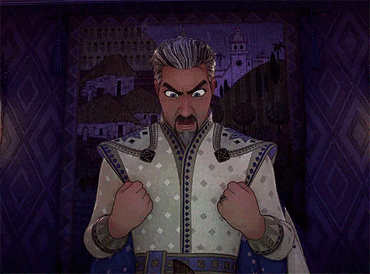
But we’re not shown that Queen Amaya has sensed any darkness building in her husband over the years, and is just now realizing that this is the last straw and maybe he was never the man she thought he was. She treats him like she adores him (blandly) for the whole first half of the movie. No hint of doubt. Even when he goes for the forbidden book the first time, she easily convinced him not to and then wandered away like “well, took care of that.”
When Asha’s mother loses her wish - The biggest problem with this moment is still lack of buildup, and that is because the tangible-wish forgetfulness thing is stupid as we’ve established. We don’t believe she feels grief, even when she says she does, because we don’t know this woman at all. We don’t know what she wants, or how badly she wants it—we certainly don’t feel that she’s been missing her wish.
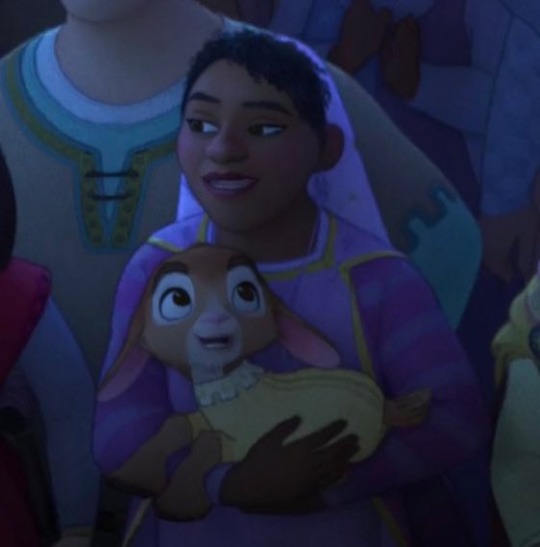
But the other offenses are worth mentioning. When Asha’s mother’s wish is broken by Magnifico, she just…gasps. And her father-in-law says her name, and Asha yells something typical like “no!” She looks a little weak in the knees, like maybe she can’t walk for a second, so the 100 year-old man supports her.
But the cameras spend no time on how this is affecting her. The shots of the family escape in the immediate aftermath of this world-shattering thing don’t let us see Asha’s mother’s face. Not that her facial expression is that devastated, anyway. It’s just “typical sadness” expression. There’s a shot where they’re going from the house to the stolen horses and if I remember correctly, Asha’s mother has her back to the camera the whole time; I was looking at her because I was like “something devastating just happened; this is the most interesting part of the scene.” But there was nothing to see.
They could’ve had her visually turn grey. They could’ve had her go mute, stare off into space, suddenly become scarily unreachable. They could’ve had her weeping uncontrollably. They could’ve just had her go catatonic—after all, we’re supposed to believe that even the chance of having “the most beautiful part of her” returned to her heart was just destroyed. Wouldn’t that logically make a person…cold? Calloused? Unfeeling? Uncaring? But no. She’s as just keen to express concern for Asha and apologize for being wrong about Magnifico and urge Asha to keep believing in herself, passionately, as she would’ve been before. No big deal, just lost the most beautiful part of myself forever.
Doesn’t help that we never knew what the mom’s wish even was, so even we can’t miss it.
So when she gets her wish back at the end, and she’s like, “come home.” It’s just…cringey.
When Asha convinces the crowd to wish for Magnifico’s defeat - The idea of the movie is that “the power of the stars is in you because we all came from stardust, so keep wishing and working toward it even when it’s hard.” So this moment is supposed to be impactful.
But it isn’t. Because that kind of thing isn’t impactful. They literally sing a song, glow, and Magnifico is defeated. Even if we were supposed to believe Star was dead, and this is bringing him back like Tinkerbell coming back to life, it’s still not impactful. Because one, it happens way too fast. And no character really emotes about it, like Peter did when he thought Tink was dead.
Two, that hasn’t been the point of the whole movie; the main character never had trouble believing that she was powerful enough to enact change. She barely doubted her own wish. If they wanted us to be excited that she could win based on the stardust in her heart, and in the kingdom’s hearts, alone, then they should’ve given us several scenes where it’s like “Asha is relying too much on Star’s power.”
But no, doubt and disbelief and reliance were never character flaws of hers for this moment to overcome. She doesn’t really have any character flaws, let’s be honest.
Even if you want to say “well sure, Asha didn’t doubt her own power, but the kingdom did! Otherwise, why would it’s citizens have put so much reliance on King Magnifico?” Okay, that’s nice, but 1) that is never solidly or impactfully alluded to in the story, beyond jokes about how handsome they think the king is and the literal plot point of trusting him with their wishes. And 2) having a whole kingdom of background characters believe something false and then get their minds changed in a split second is not nearly as impactful as having the main character’s mind changed first—and then she passes that knowledge on to them.
Like Judy Hopps learning to try to understand Nick, then encouraging all of Zootopia to try and understand each other. Like literally any good story where a whole kingdom needs to realize something.
Also it is never a good idea to defeat your villain just by singing about how you want to defeat your villain. Nobody should have to tell Disney that. They wrote the book on this.
But this movie was made by a company that no longer knows itself.
I could say more, like about the moment where Asha supposedly is at her lowest, or the part where Star “leaves,” or when her friends work together, or the “Knowing What I Know Now” song, but it’s all the same problems.
#Wish#Disney’s wish#character analysis#meta#Mulan#Disney’s Mulan#Disney#wish Disney#wish movie#animated movies#spoilers#review#Valentino#Asha#ariana debose#Disney’s the princess and the frog#the princess and the frog#Tiana
303 notes
·
View notes
Text
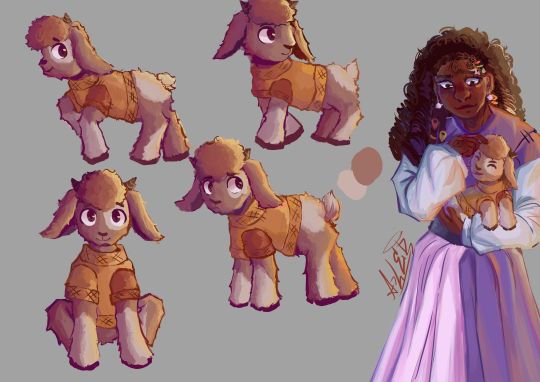
¡ Valentino redesing!
We finally have the baby!
(This redesign belongs to the Wish Au "Kingdom of wishes", written by @annymation and illustrated by @emillyverse and me)
This will surely be the redesign where I have the least things to say lol, but I still have some things to comment on so let's go!
At first I hadn't thought much about how I would redesign Valentino, what I was sure of was making him more adorable and cuter so that everyone would want to have a goat as a pet, because if I'm completely honest, Valentino's official design in the Disney movie I didn't find it adorable at all (sorry Disney artists, I know they put effort into drawing and animating but I just didn't like Valentino's design)
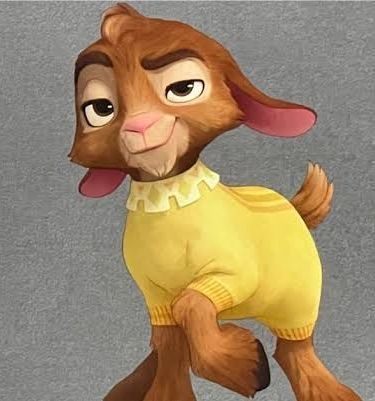
(Do you get my point? He's just not cute or adorable, and the voice they gave him didn't help either, or the face idk ,but I thought the joke about his voice at the beginning of the movie was funny ¯_(ツ)_/¯)
So I made a mental list of things I wanted to do (which aren't many if I'm honest):
-Make it fluffier and fluffier
-Give him other clothes
-Add even one symbol in your redesign
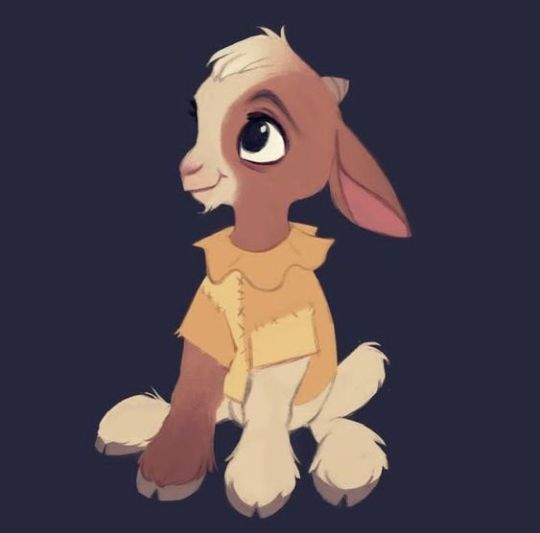
Anny sent me several references of goats and concept art, among them I found this one, which I based myself on mainly because 1-I have always liked that animals had moles or spots on their fur or skin 2-When I saw that on their clothes You could see the seams that joined the different fabrics, I realized that it coincided with Asha's redesign (on the sleeves) so I was like: "AWWWWW it matches his mom's clothes!"
In the end I only added a part of it with a different fabric because I didn't want to complicate the design too much, but I liked how it turned out, I added some symbols of the tattoos that exist in the Amazigh culture, which is also to protect the person (or animal in this case) of the bad influences that are around them
I also liked adding that little ball of curly hair on our goat's little head, it just looks so cute!
FINAL COMMENTS!
As I said, this is not very long, but I'm satisfied with how the drawing turned out, I wanted to try something new that looks like the lighting was a sunset, I don't know if it's noticeable but at least it turned out nice lmao, as a curious fact, with this drawing I realized how MUCH my sketches change when I paint them in detail
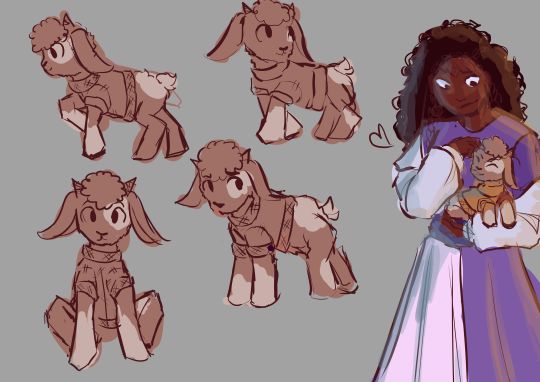

…..BRO HOW THE HELL DID THIS CHANGE SO MUCH WITHOUT REALIZING ME? (ESPECIALLY ASHA)
Well that's all for now, until next time! ✨✨
#disney wish#wish 2023#art#artists on tumblr#artwork#wish#sketch#disney#drawing#wish movie#the kingdom of wishes desings#the kingdom of wishes au comic#the kingdom of wishes au#the kingdom of wishes fandom#the kingdom of wishes#wish reimagined#wish rewrite#wish redesign#wish review#disney wish star#wish asha#wish disney#queen amaya#king magnifico#disney movies#disney animation#disney fanart#wish star#kow au#artist
117 notes
·
View notes
Text
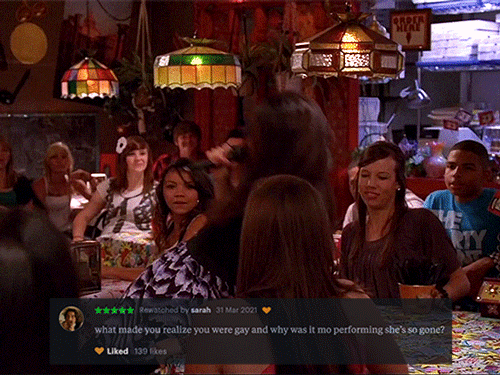
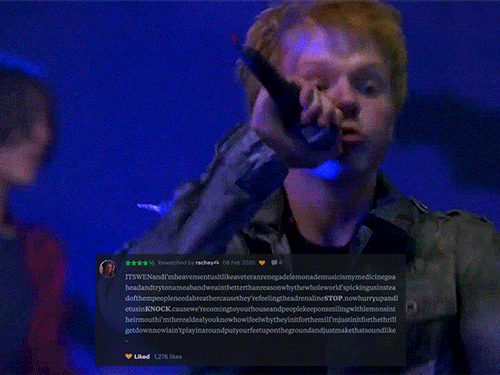
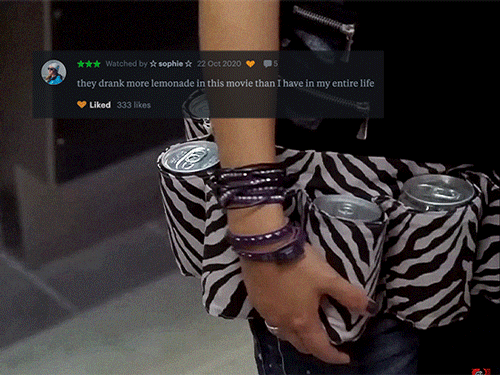
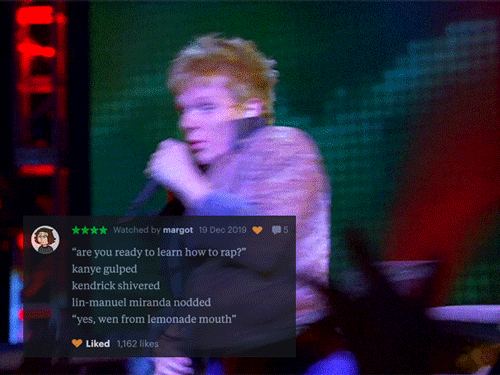

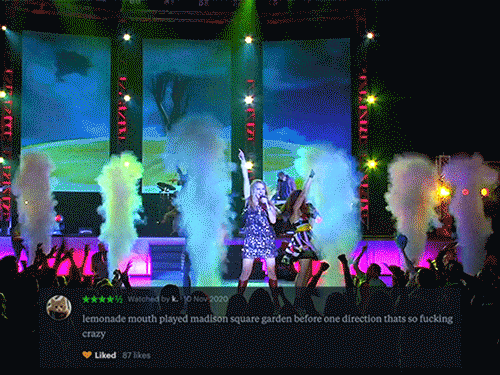
LEMONADE MOUTH + letterboxd reviews
2011 | dir. Patricia Riggen
#*mine#*lemonade mouth#*letterboxd#letterboxd reviews#lemonade mouth#bbelcher#userbbelcher#chewieblog#nessa007#filmgifs#moviegifs#filmtvcentral#disney channel#dailyflicks#filmedit#filmtvdaily#cinematv#cinemapix#throwbackblr#doyouevenfilm#userrobin#2010s#fav
231 notes
·
View notes